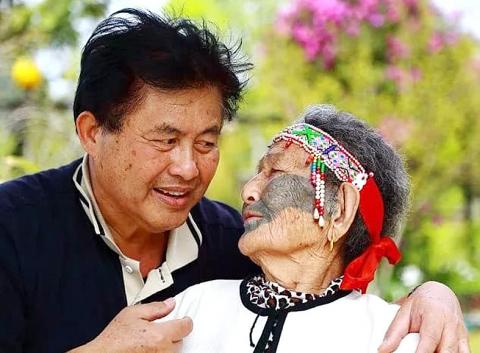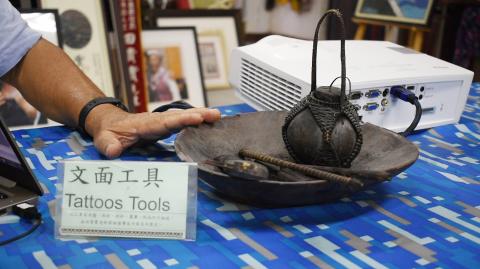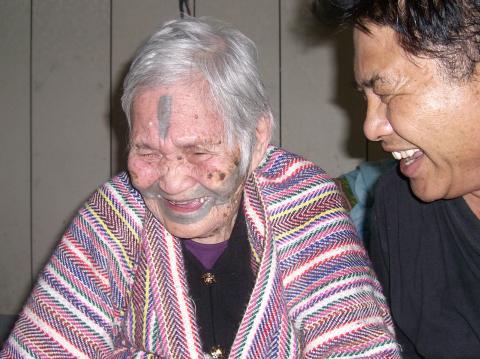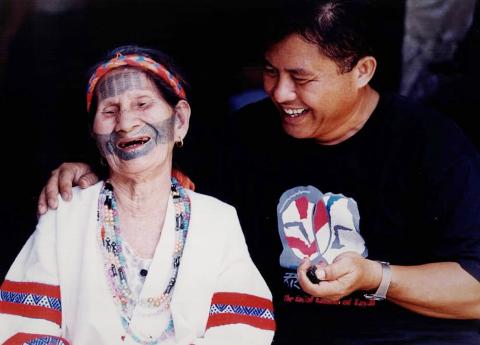Under a clear mountain sky, an Atayal boy of 12 prepares to transition into a man by way of a painful ceremony passed down by his ancestors. Like many boys his age, he has proven his valor and courage by mastering the art of hunting. In another village, a girl of similar age awaits her own passage into maturity after mastering her craft of weaving. Both subjects wait as a mixture of charcoal and pine tree oil is prepared, applied and slowly pushed under the sensitive skin on their cheeks and foreheads.
This narrative describes traditional facial tattooing, the most significant coming-of-age ceremony for the Atayal, one of Taiwan’s sixteen recognized indigenous tribes. Often referred to as a “cultural treasure,” this custom began to disappear when the Japanese controlled Taiwan from 1895 to 1945.
“My grandmother had facial tattoos, and they were very beautiful,” said cultural advocate and historian Kimi Sibal in a recent interview.

Photo courtesy of Kimi Sibal
When Sibal was seven years old he became intrigued by the distinct ash-colored markings on his grandmother’s face. It wasn’t until a family photoshoot that he ask her: “Why do you have those tattoos?”
Rather than the captivating story that Sibal had expected to hear, he was faced with a different response. “We mustn’t speak of it. I can’t tell you.”
INTOLERANT ATTITUDES

Photo: Sylvia Dean
During Japanese rule, sacred practices such as facial tattooing were prohibited due to intolerant attitudes towards indigenous communities. In an effort to exercise authority over a group seen by colonizers as savage, indigenous communities living in the mountains were driven down to flatter land, where they were easier to regulate and control. After years of oppression, his grandmother had been conditioned to be ashamed of the tattoos.
As a Hualien native and a member of the Seediq community, Kimi didn’t learn about his heritage until much later in life. After his grandmother passed away, Sibal felt as if he had lost the opportunity to find answers about his ancestors. It wasn’t until decades later, after he became a husband and a father, that he began to uncover the truth.
Sibal recalls an incident involving his son when he first began school that awakened him to the importance of learning about his background. The boy got into a fight with his classmates because they targeted his heritage, sneering that the tattoos worn by his ancestors made them look like monsters, and that he was from a bloodline of savages. Sibal resolved to both discover the story behind his own ancestry, and to share the true meaning behind the custom of facial tattooing.

Photo courtesy of Kimi Sibal
“I took my camera, I took my voice recorder and I set out. I found that there were still many people who had tattoos,” he says.
Today, Sibal has dedicated years of his life to the documentation of this sacred practice, and displays an extensive collection of his work in Hualien. Today, there are only two remaining elders with facial tattoos — one of them is 98 years old, and the other is 99.
“They won’t be here for much longer. I came to think, why have I been researching these people for all these years? Well, the words they speak are filled with history. The words they speak are rich and wonderful,” Sibal says.

Photo courtesy of Kimi Sibal
Sibal has captured hundreds of portraits of tattooed elders and has written many books about this symbolic custom.
“After years of research, I finally began to realize why thousands of people passed down these tattoos, their meaning and their spirit,” Sibal says.
SIGNIFICANCE OF TATTOOS
He lists four main reasons for the preservation of facial tattoos: Tribal recognition, protection against evil spirits, access to the afterlife and beauty.
Although the meanings behind these facial tattoos are representative of honor and high achievement, with the advent of colonization, they have often been falsely interpreted. As Sibal’s son discovered at school, it’s common for groups that practice facial tattooing to be falsely marked as barbaric, uncivilized and criminal.
“As long as we are here, no matter what we do, we are not treated fairly on this earth. There is no mutual respect,” Sibal says. “What they write about our culture, about our language, is in the eyes and interpretation of the government. They can write whatever they want, but today I am doing this honorable work, because the ones that have these tattoos are my own ancestors.”
Through his work documenting the lives of Atayal elders, Sibal’s legacy will remain for many years to come.
“The most important thing is for these tattoos to be recorded,” Sibal says. “We must let the next generation know that the markings their ancestors have on their face represents bravery and capability.”

April 28 to May 4 During the Japanese colonial era, a city’s “first” high school typically served Japanese students, while Taiwanese attended the “second” high school. Only in Taichung was this reversed. That’s because when Taichung First High School opened its doors on May 1, 1915 to serve Taiwanese students who were previously barred from secondary education, it was the only high school in town. Former principal Hideo Azukisawa threatened to quit when the government in 1922 attempted to transfer the “first” designation to a new local high school for Japanese students, leading to this unusual situation. Prior to the Taichung First

Chinese Nationalist Party (KMT) Chairman Eric Chu (朱立倫) hatched a bold plan to charge forward and seize the initiative when he held a protest in front of the Taipei City Prosecutors’ Office. Though risky, because illegal, its success would help tackle at least six problems facing both himself and the KMT. What he did not see coming was Taipei Mayor Chiang Wan-an (將萬安) tripping him up out of the gate. In spite of Chu being the most consequential and successful KMT chairman since the early 2010s — arguably saving the party from financial ruin and restoring its electoral viability —

The Ministry of Education last month proposed a nationwide ban on mobile devices in schools, aiming to curb concerns over student phone addiction. Under the revised regulation, which will take effect in August, teachers and schools will be required to collect mobile devices — including phones, laptops and wearables devices — for safekeeping during school hours, unless they are being used for educational purposes. For Chang Fong-ching (張鳳琴), the ban will have a positive impact. “It’s a good move,” says the professor in the department of

Article 2 of the Additional Articles of the Constitution of the Republic of China (中華民國憲法增修條文) stipulates that upon a vote of no confidence in the premier, the president can dissolve the legislature within 10 days. If the legislature is dissolved, a new legislative election must be held within 60 days, and the legislators’ terms will then be reckoned from that election. Two weeks ago Taipei Mayor Chiang Wan-an (蔣萬安) of the Chinese Nationalist Party (KMT) proposed that the legislature hold a vote of no confidence in the premier and dare the president to dissolve the legislature. The legislature is currently controlled